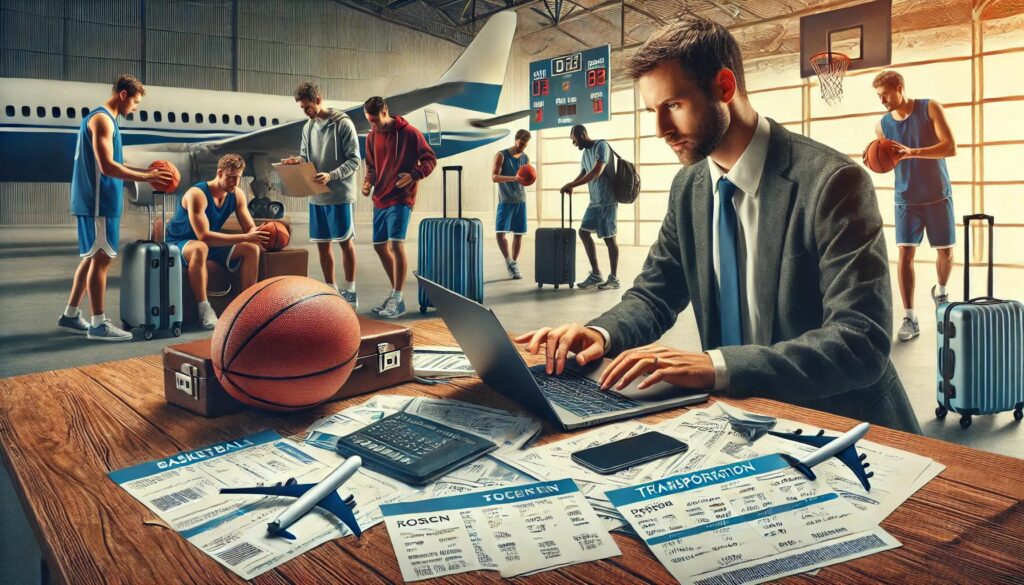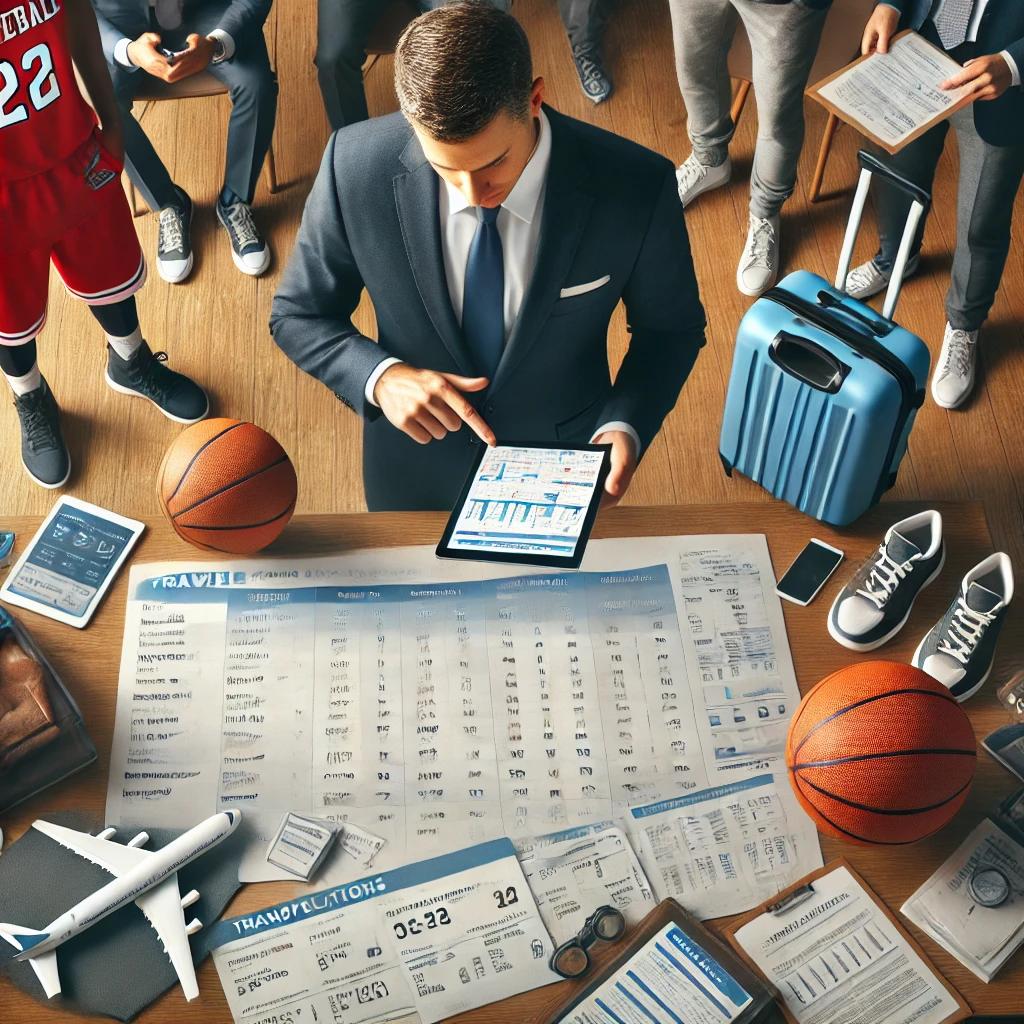Managing Team Travel and Logistics: What You Need to Know as a Basketball Coach
Effective management of team travel and logistics is crucial for ensuring a smooth and successful experience for players, coaches, and staff. From organizing transportation and accommodations to coordinating meals and schedules, thorough planning and attention to detail are essential.
Here’s a comprehensive guide to managing team travel and logistics.
1. Planning and Preparation
1.1 Establish a Travel Plan
- Travel Dates: Determine the travel dates well in advance, including departure and return times.
- Destination Details: Gather information about the destination, including venue location, local amenities, and weather conditions.
- Logistics Planning: Emphasize the importance of logistics planning to coordinate transportation, accommodations, and schedules effectively. This ensures that athletes can perform at their best on game day.
1.2 Budgeting
- Cost Estimates: Create a detailed budget that includes transportation, accommodations, meals, and other expenses.
- Expense Tracking: Keep track of all expenses to stay within budget and ensure transparency.
1.3 Travel Policy
- Guidelines: Develop and communicate a travel policy outlining expectations for behavior, attire, and other relevant details.
- Compliance: Ensure all team members are aware of and comply with the travel policy.

2. Transportation Arrangements
2.1 Selecting Transportation
- Mode of Transport: Choose the appropriate mode of transportation (bus, plane, train, etc.) based on distance, budget, and convenience.
- Booking Flights: Utilize technology such as online resources, travel apps, and booking platforms to simplify the process of booking flights and managing travel itineraries. This ensures efficiency and compliance with travel policies.
- Air Travel: Consider the benefits and drawbacks of air travel, including the speed advantage over road travel. Evaluate options between commercial airlines and private jet charters, taking into account convenience, luggage handling, and overall comfort. Be aware of the risks of lost luggage when flying commercially, as luggage space may be limited and additional fees may apply.
2.2 Coordinating Travel
- Departure and Arrival: Coordinate departure and arrival times to ensure a smooth transition to and from the venue.
- Transport Details: Provide all team members with detailed information about transportation arrangements, including pick-up and drop-off locations.
- Ground Transportation: Emphasize the importance of effective communication about ground transportation details to reduce stress and improve satisfaction. Ensure all updates to the travel itinerary are clearly communicated.
2.3 Special Considerations
- Accessibility: Ensure transportation is accessible for players with disabilities or special needs.
- Luggage Space: Arrange for the safe transport of sports equipment, ensuring there is sufficient luggage space. Larger motor coaches offer more luggage space compared to mini-buses or school buses, which have limited capacity.
3. Accommodation Arrangements
3.1 Booking Hotels
- Location: Select accommodations close to the venue to minimize travel time and enhance convenience.
- Preferred Hotel Chains: Opt for preferred hotel chains that align with corporate policies. This ensures consistency in service quality and can often provide better rates and amenities.
- Room Assignments: Arrange room assignments based on team preferences, ensuring privacy and comfort.
3.2 Hotel Details
- Reservations: Confirm reservations and communicate check-in/check-out times to the team.
- Amenities: Ensure accommodations offer necessary amenities, such as Wi-Fi, meeting spaces, and breakfast options.
3.3 Special Requests
- Dietary Needs: Notify the hotel of any dietary restrictions or special requests related to meals.
- Accessibility: Confirm that accessible rooms and facilities are available if needed.
4. Meal Planning
4.1 Dining Arrangements
- Meal Scheduling: Plan meal times that align with the team’s schedule and avoid conflicts with practice or game times.
- Restaurant Choices: Select restaurants or caterers that accommodate dietary restrictions and offer balanced meal options.
4.2 Nutritional Considerations
- Pre-Game Nutrition: Ensure meals provide the necessary nutrients and energy for optimal performance.
- Hydration: Plan for adequate hydration, including access to water and electrolyte drinks.
4.3 Meal Logistics
- Reservations: Make reservations for large groups to avoid long waits and ensure prompt service.
- Packing: Consider packing snacks or travel-friendly meals for times when dining options are limited.
5. Scheduling and Itinerary
5.1 Creating an Itinerary
- Detailed Schedule: Develop a detailed itinerary that includes practice times, game times, meal times, and free time.
- Effective Communication of Travel Itineraries: Distribute the travel itineraries to all team members, coaches, and support staff, ensuring everyone is informed of any real-time updates or changes to enhance overall travel experience and satisfaction.
- Analyzing Travel Patterns: Utilize data analytics to understand travel patterns, which can help optimize scheduling and logistics, leading to better decision-making and improved travel policies.
5.2 Flexibility
- Contingency Plans: Prepare for potential changes or delays by having contingency plans in place.
- Adaptability: Be prepared to adjust the schedule as needed based on unforeseen circumstances.
5.3 Communication
- Updates: Provide timely updates and reminders about schedule changes or important information.
- Points of Contact: Designate a point of contact for any travel-related questions or issues.
6. Managing Team Needs
6.1 Health and Safety
- Medical Kit: Ensure a well-stocked medical kit is available for any health or injury-related issues.
- Emergency Contacts: Keep a list of local emergency contacts and medical facilities.
6.2 Team Comfort
- Rest Time: Schedule adequate rest time to ensure sports teams are well-rested and prepared for games.
- Support Staff: Ensure that support staff, including trainers and managers, have the resources and accommodations they need to support all team members effectively.
6.3 Communication Devices
- Contact Information: Provide players and staff with contact information for key personnel and the team’s travel coordinator.
- Emergency Protocols: Establish protocols for handling any emergencies or unexpected situations.
7. Post-Travel Follow-Up
7.1 Debriefing
- Team Meeting: Hold a debriefing meeting to discuss the travel experience, address any issues, and gather feedback.
- Lessons Learned: Review what worked well and identify areas for improvement in future travel plans.
7.2 Expense Reporting
- Reimbursement: Process any reimbursement requests from staff or players related to travel expenses.
- Expense Management: Emphasize the importance of expense management by tracking and managing travel expenses. Ensure compliance with travel policies and streamline expense reimbursement procedures. Utilize technology to integrate travel expenses into booking processes, improving accuracy and efficiency in managing travel budgets.
- Financial Review: Conduct a financial review to ensure all expenses are accounted for and within budget.
7.3 Maintaining Relationships
- Thank You Notes: Send thank-you notes to hotels, transportation providers, and other partners who contributed to the success of the trip.
- Feedback: Provide feedback to partners to help improve future arrangements.
Managing Sports Team Travel and Logistics: A Comprehensive Guide Conclusion
Managing team travel and logistics requires careful planning, coordination, and attention to detail. By establishing clear policies, organizing transportation and accommodations, planning meals, and managing team needs, coaches can ensure a smooth and successful travel experience for their players and staff.
Effective travel management not only enhances team performance but also contributes to a positive and enjoyable experience for everyone involved.




